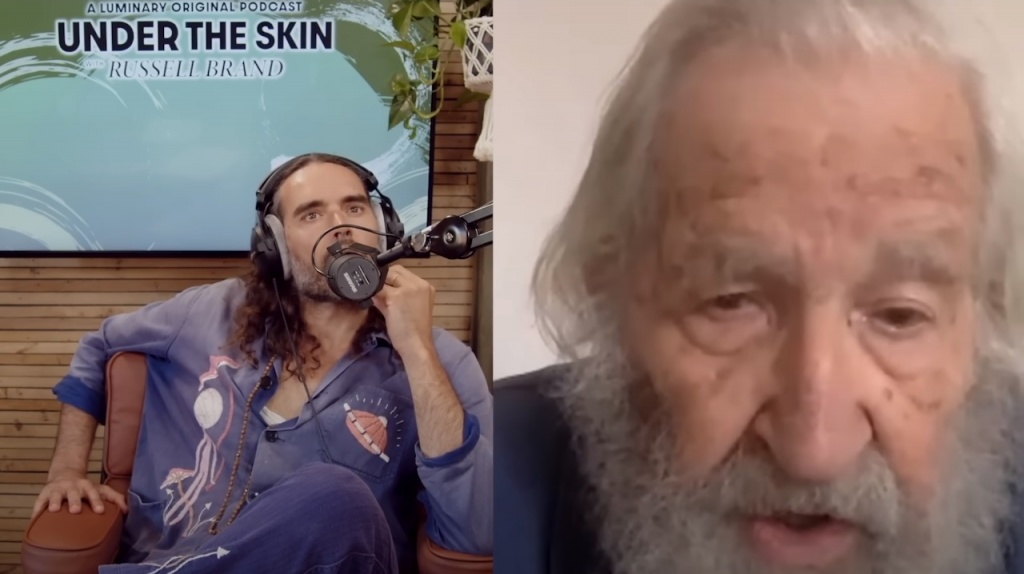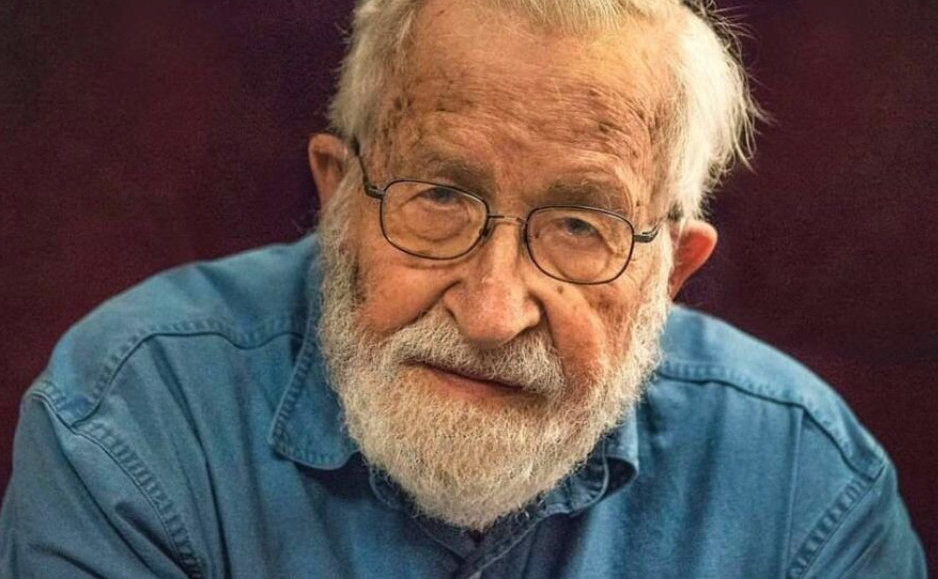
Noam Chomsky: U.S. Censorship “Worse Than In Soviet Russia”
/ Главная / Russkiy Mir Foundation / Publications / Noam Chomsky: U.S. Censorship “Worse Than In Soviet Russia”Noam Chomsky: U.S. Censorship “Worse Than In Soviet Russia”

Photo: screenshot
"It's official! The American mainstream media censors more than Soviet Russia! Who said that? You’re not going to believe it- Noam Chomsky!" Russell Brand, the popular British stand-up comedian and media personality, pulled no punches opening a program on his Youtube channel.
In case there is someone unaware, Noam Chomsky is a world-renowned scholar, a distinguished linguist, and one of the most influential thinkers of the past 50 years.
Professor Chomsky has been known for his active public position, his left-wing views, and criticism of aggressive U.S. foreign policy from the days of the Vietnam War. Today, he is indignant at the absolute absence of freedom and the actual prohibition to show any other viewpoint on Russian policy and the causes of the Ukrainian crisis in the U.S. media.
“The US is living under a totalitarian culture.” (Noam Chomsky)
Noam Chomsky's words address the significance of freedom of expression in society. According to him, it is vitally important for the United States these days because censorship completely silences any other point of view.
“The United States is living under a kind of totalitarian culture, which has never existed in my lifetime, Professor Chomsky says. “And it’s much worse in many ways than the Soviet Union before Gorbachev. Go back to the 1970s. The People in Soviet Russia could access BBC, Voice of America, and German television if they wanted to find out the news. If today in the United States, you want to find out what Foreign Minister of Russia Lavrov is saying (N. Chomsky mistakenly referred to Lavrov as Russia's Prime Minister - ed.), you can’t do it. It’s worrying.
Americans are not permitted to hear what Russians are saying. You can’t get Russian television. You can’t access Russian sources. That means also that fine American journalists, like Chris Hedges (Pulitzer Prize winner 2002. – ed.), one of the best, are cut out from Americans because he happens to have a program running on RT, Russian television. You want to find out what the adversary is saying, which is of utmost importance, you can maybe tune into Indian State television and find it out. You can read it on Al Jazeera. But the United States Has imposed constraints on freedom of access to information, which are astonishing and which, in fact, go beyond what was the case in post-Stalin Soviet Russia.

That’s just a remarkable fact. Anyone who dares to break the party line on the dominant issue of today, Ukraine, is simply demonized, vilified, and can be sent to Gulag. It’s a free country still but you can barely talk. And that has very dangerous implications for the current situation and beyond.”
“It is a free country still, but you can barely talk.” (Noam Chomsky)
Russell Brand also agrees with Chomsky. «You can't talk about the war in Ukraine without censorship... Why is that? Why are people afraid of having an honest and open conversation? When people say disinformation, I think what they mean is, “Shut up! We only want one perspective.” I believe you are capable of taking on more than one point of view. I believe that you are capable of understanding a wide set of facts, a broad scope of data, and forming your own opinion. We’re not children. We’re not idiots. They are trying to infantilize and disempower us, and they have been doing it for too long,” he says.
Brand's YouTube channel has 5.79 million subscribers. The video has got 52,000 likes and over 12,000 comments. Being a famous celebrity, Brand is known for his erratic path, however, in this case, the discussion is serious. It seems that nowadays, only Titans like Chomsky, as well as such outstanding hell-raisers, would not face "cancellation” when they openly express their views that are inconvenient to the mainstream in the West.
New publications

 Mikhail Kalatozov, a director who transformed the world of cinematography in many ways, was born 120 years ago. He was a Soviet film official and a propagandist. Above all, he was capable of producing movies that struck viewers with their power and poetic language.
Mikhail Kalatozov, a director who transformed the world of cinematography in many ways, was born 120 years ago. He was a Soviet film official and a propagandist. Above all, he was capable of producing movies that struck viewers with their power and poetic language.  Ukrainian authorities have launched a persecution campaign against the canonical Ukrainian Orthodox Church (UOC), the biggest one in the country's modern history. Over the past year, state sanctions were imposed on clergy representatives, searches were conducted in churches, clergymen were arrested, criminal cases were initiated, the activity of the UOC was banned in various regions of the country, and monasteries and churches were seized.
Ukrainian authorities have launched a persecution campaign against the canonical Ukrainian Orthodox Church (UOC), the biggest one in the country's modern history. Over the past year, state sanctions were imposed on clergy representatives, searches were conducted in churches, clergymen were arrested, criminal cases were initiated, the activity of the UOC was banned in various regions of the country, and monasteries and churches were seized.  When Nektary Kotlyaroff, a fourth-generation Russian Australian and founder of the Russian Orthodox Choir in Sydney, first visited Russia, the first person he spoke to was a cab driver at the airport. Having heard that Nektariy's ancestors left Russia more than 100 years ago, the driver was astonished, "How come you haven't forgotten the Russian language?" Nektary Kotlyaroff repeated his answer in an interview with the Russkiy Mir. His affinity to the Orthodox Church (many of his ancestors and relatives were priests) and the traditions of a large Russian family brought from Russia helped him to preserve the Russian language.
When Nektary Kotlyaroff, a fourth-generation Russian Australian and founder of the Russian Orthodox Choir in Sydney, first visited Russia, the first person he spoke to was a cab driver at the airport. Having heard that Nektariy's ancestors left Russia more than 100 years ago, the driver was astonished, "How come you haven't forgotten the Russian language?" Nektary Kotlyaroff repeated his answer in an interview with the Russkiy Mir. His affinity to the Orthodox Church (many of his ancestors and relatives were priests) and the traditions of a large Russian family brought from Russia helped him to preserve the Russian language.

 The leaders of the Friends of the Great Russia cultural association (Amici Della Grande Russia) in Italy believe that the Western policy of abolishing Russian culture in Europe has finally failed. Furthermore, it was doomed to failure from the beginning.
The leaders of the Friends of the Great Russia cultural association (Amici Della Grande Russia) in Italy believe that the Western policy of abolishing Russian culture in Europe has finally failed. Furthermore, it was doomed to failure from the beginning.  Name of Vladimir Nemirovich-Danchenko is inscribed in the history of Russian theater along with Konstantin Stanislavski, the other founding father of the Moscow Art Theater. Nevertheless, Mr. Nemirovich-Danchenko was a renowned writer, playwright, and theater teacher even before their famous meeting in the Slavic Bazaar restaurant. Furthermore, it was Mr. Nemirovich-Danchenko who came up with the idea of establishing a new "people's" theater believing that the theater could become a "department of public education."
Name of Vladimir Nemirovich-Danchenko is inscribed in the history of Russian theater along with Konstantin Stanislavski, the other founding father of the Moscow Art Theater. Nevertheless, Mr. Nemirovich-Danchenko was a renowned writer, playwright, and theater teacher even before their famous meeting in the Slavic Bazaar restaurant. Furthermore, it was Mr. Nemirovich-Danchenko who came up with the idea of establishing a new "people's" theater believing that the theater could become a "department of public education."  "Russia is a thing of which the intellect cannot conceive..." by Fyodor Tyutchev are famous among Russians at least. December marks the 220th anniversary of the poet's birth. Yet, he never considered poetry to be his life's mission and was preoccupied with matters of a global scale. Mr.Tyutchev fought his war focusing on relations between Russia and the West, the origins of mutual misunderstanding, and the origins of Russophobia. When you read his works today, it feels as though he saw things coming in a crystal ball...
"Russia is a thing of which the intellect cannot conceive..." by Fyodor Tyutchev are famous among Russians at least. December marks the 220th anniversary of the poet's birth. Yet, he never considered poetry to be his life's mission and was preoccupied with matters of a global scale. Mr.Tyutchev fought his war focusing on relations between Russia and the West, the origins of mutual misunderstanding, and the origins of Russophobia. When you read his works today, it feels as though he saw things coming in a crystal ball...